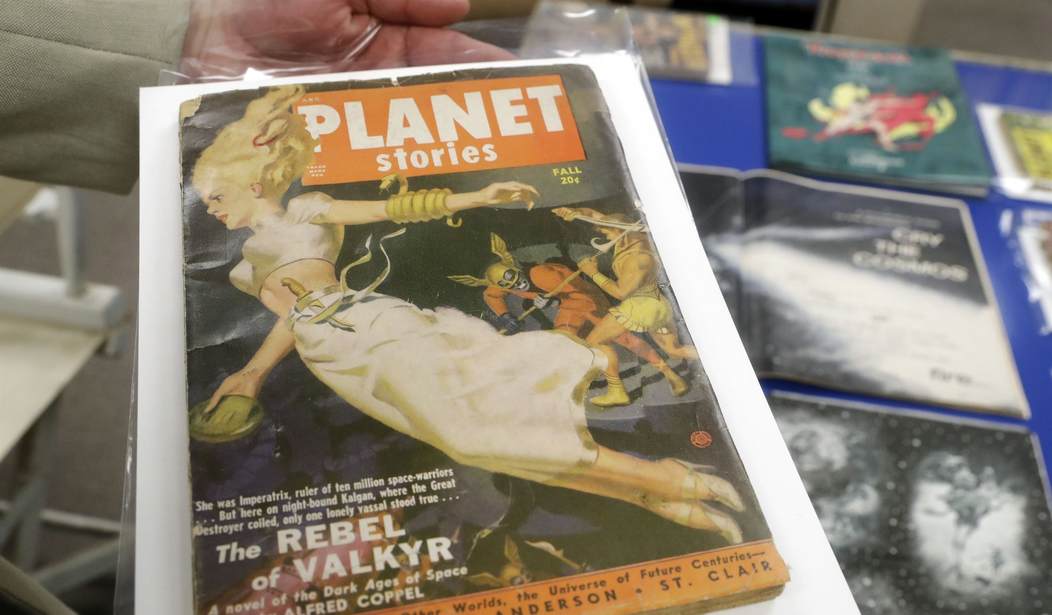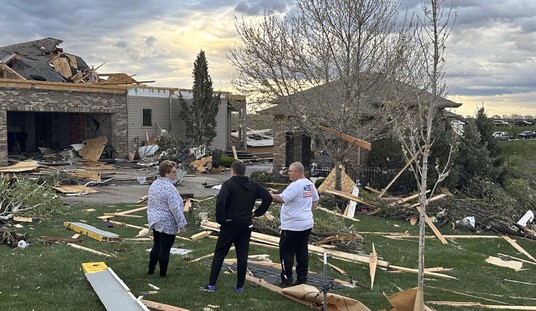When I was a little kid, one of my particular pleasures was reading my way through my father's extensive stack of sci-fi pulp magazines. In the late '60s and early '70s, Dad subscribed to such works as "Amazing Stories," "Galaxy," "Astounding" and "Analog." I still have some of Dad's old magazines around here someplace, including one treasured copy of "Amazing Stories" from October 1961 — the month of my birth.
And, of course, on television, there were great shows like "Lost in Space," and when I got a little older, "Star Trek."
There are a couple of neat things about science fiction. Speaking as a writer of science fiction and alternative history myself, one of those neat things is the breathtaking abandon with which we just make stuff up; for one of my books, I wanted a communications system that operated instantaneously over interstellar distances, so I wrote up some hooraw about quantum entanglement communications that would probably make any actual physicist burst out laughing, at which point I would refer them to the old fiction writer's principle of "Device, Plot, 1 Each."
But the other neat thing about science fiction is its predictive capacity. That's what's interesting about a recent article from BigThink, in which some sci-fi authors (not me) spoke about how science fiction can become science present.
Behind most every tech billionaire is a sci-fi novel they read as a teenager. For Bill Gates it was Stranger in a Strange Land, the 1960s epic detailing the culture clashes that arise when a Martian visits Earth. Google’s Sergey Brin has said it was Neal Stephenson’s Snow Crash, the cyberpunk classic about hackers and computer viruses set in an Orwellian Los Angeles. Jeff Bezos cites Iain M. Banks’ Culture series, which unreel in an utopian society of humanoids and artificial intelligences, often orchestrated by “Minds,” a powerful AI. Elon Musk named three of SpaceX’s landing drones after starships from Banks’ books, a tribute to the role they played in turning his eyes to the stars.
Part of this makes sense. Science fiction widens the frontiers of our aspirations. It introduces us to new technologies that could shape the world, and new ideas and political systems that could organize it. It’s difficult to be an architect of the future without a pioneer’s vision of what that future might look like. For many, science fiction blasts that vision open.
And here's the thing: It's not just a matter of "could." It's a matter of "did." I can think of several times where, if science fiction didn't shape the future, it certainly predicted it.
See Related: Valdez, Alaska to Gain Statue of Famous Resident, Born in 2335: One William T. Riker
So It Begins: First Person With Brain Chip Implant Can Play Video Games With His Mind
First: I was fortunate to attend DragonCon in 2008 as an invited guest and panelist, even. For those of you who aren't familiar with that event, DragonCon is an enormous sci-fi, fantasy, and pop culture convention held annually in Atlanta, Georgia; people from all over the world attend, along with writers, actors, producers, and everyone involved in the business. My wife and I attended the awards banquet wherein the main speaker was Robert Picardo, of "Star Trek: Voyager" fame. During his presentation, he reminded us of watching Captain James T. Kirk whipping out his communicator, flipping it open, and speaking to the Enterprise in orbit — then pulling out his own cell phone, flipping it open, and saying, "See? Here's my communicator." Not a perfect example, but in 2008, Mr. Picardo had a flip phone, whereas now each of us carries a computer everywhere, with a camera, a navigation system, and access to a planetary library. A modern smartphone is more akin to Mr. Spock's tricorder than a communicator.
Second: Nuclear weapons. H.G. Wells, in his 1914 novel "The World Set Free," postulated "atomic bombs" (the first use of that term that I'm aware of) that pilots flung from airplane cockpits to destroy entire cities. Wells got the size and weight of atomic bombs wrong, but not the destructive power, as the United States demonstrated with great finality 31 years later over two cities called Hiroshima and Nagasaki.
Third: The internet. Almost no one in science fiction saw this coming, but the immortal Isaac Asimov came closest, wherein several books and short stories, he postulated a global computer that every citizen could access and ask questions. The computer, normally called "Univac" or "Multivac," generally required typing in a query and getting the answer back printed on a card, and it was one computer rather than a vast, decentralized network of machines all speaking and sharing information. But Dr. A came as close as anyone to foreseeing the Information Revolution.
Science fiction can be a lot of fun. It can be predictive, and sometimes it can be somewhat laughable; much as I love "Star Trek," it's something of a shibboleth among sci-fi authors and fans that "Star Trek science" is a synonym for "Bull***t." But science fiction writers and producers look into the future, take our present technology and societies, and project them into that unknown future; and it's fun going back a few years and reading the older works and marveling at how often they got it right.













